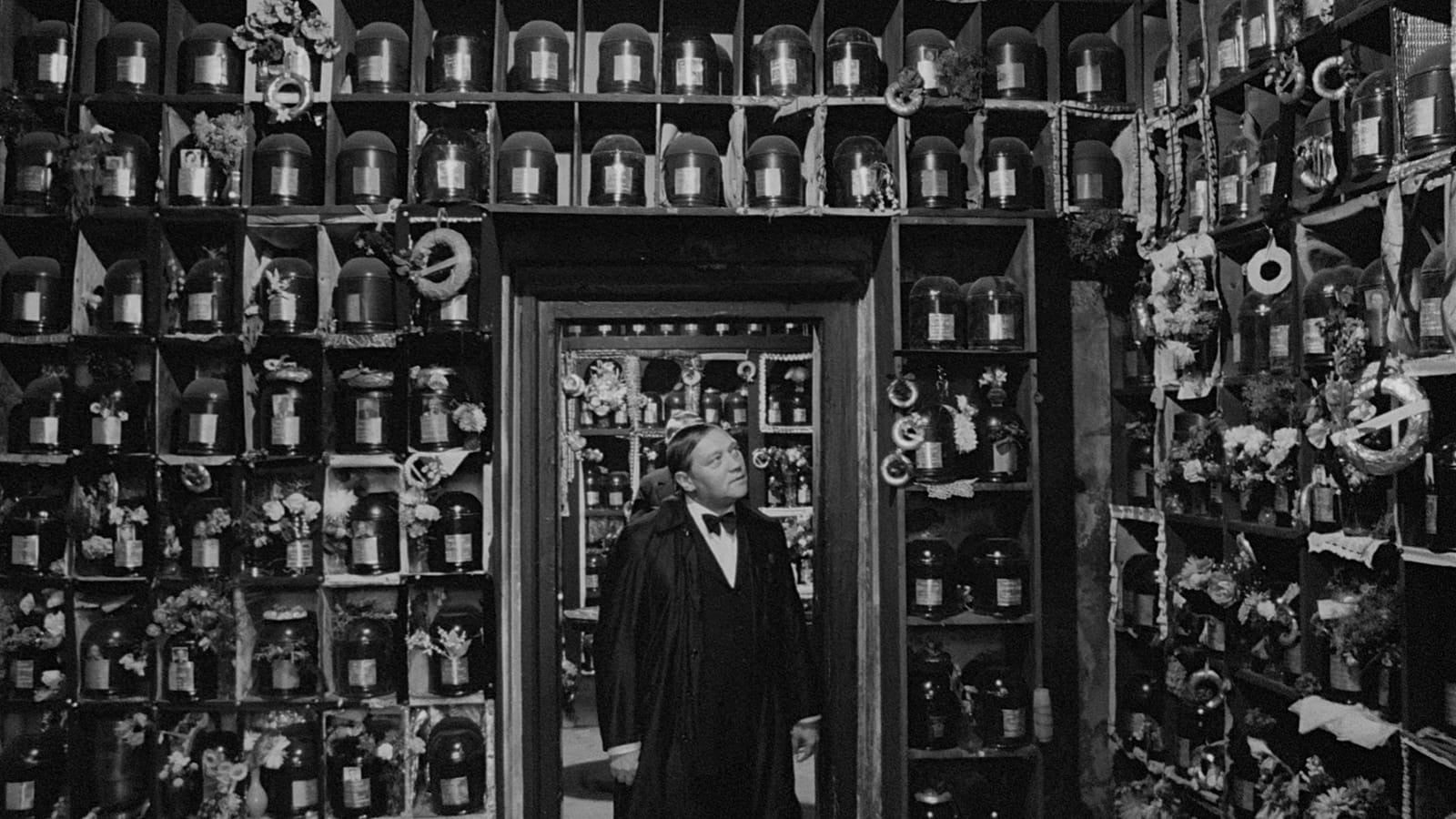
“Czech Karel Kopfrkingl enjoys his job at a crematorium in the late 1930s. He likes reading the Tibetan book of the dead, and espouses the view that cremation relieves earthly suffering. At a reception, he meets Reineke, with whom he fought for Austria in the first World War. Reineke convinces Kopfrkingl to emphasize his supposedly German heritage, including sending his timid son to the German school. Reineke then suggests that Kopfrkingl’s half-Jewish wife is holding back his advancement in his job.”
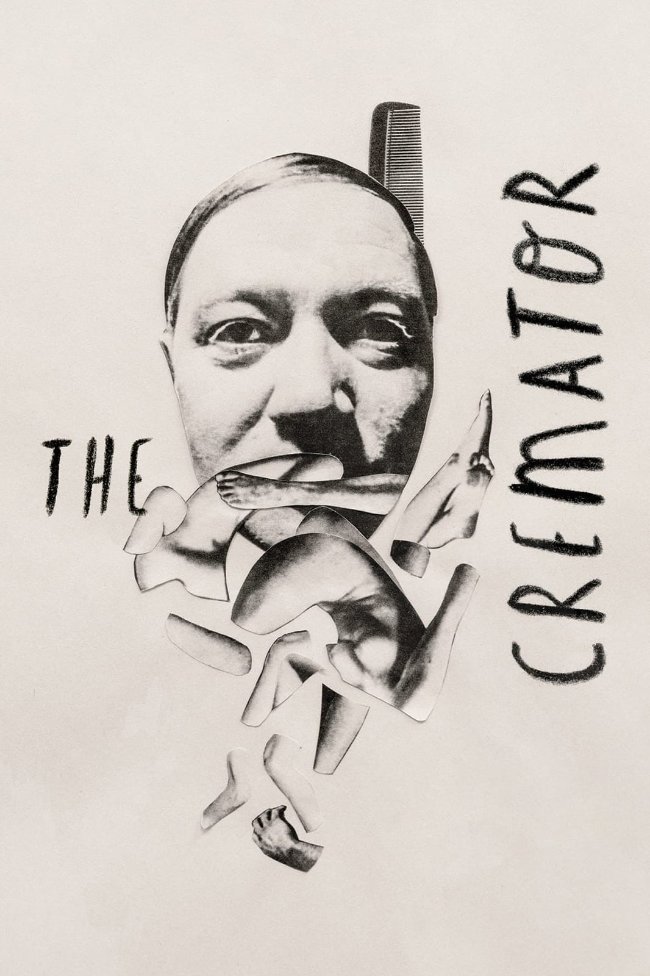
The Cremator is a sinister, immensely vulgar black comedy that plunges us into the desolate realm of a conceited, compulsive undertaker with a foolish penchant for the supposed liberation brought by premature death. A masterstroke on details, daunting evocations, and inventive chills, it surpasses generic horror film tropes.
Juraj Herz creates an overly morbid character study by filling every frame with eerie elements and terrifying musical scores that expound the wickedness of the atmosphere. From the beginning, we are fed viscerally unsettling close up images of the family and the incarcerated leopard, to the absurd animated credit sequence that graphically implies the macabre that we are about to witness. The expressionistic photography adds a sophisticated grit through the use of black and white and warped shots choices.
Rudolf Hrušínský’s powerful physical presence is a tour de force that infuses every scene with subtle yet reverberating trepidation. He captures the lofty and condescending demeanor of the cremator. Just like the portrayals of sociopathic murderers in films, he never flinches from his macabre acts nor stutters from his disturbing monologues. However, unlike the trope, he seamlessly delivers these exploits with a straight face, a feat that never requires murderous gaze or menacing laugh. Even at times of utter defeat, he still maintains a steadfast demeanor. He asserts his noble status by recapping quips from what he hears and reads, thoroughly owning different personas to adapt in different crowds of people he immerses into.
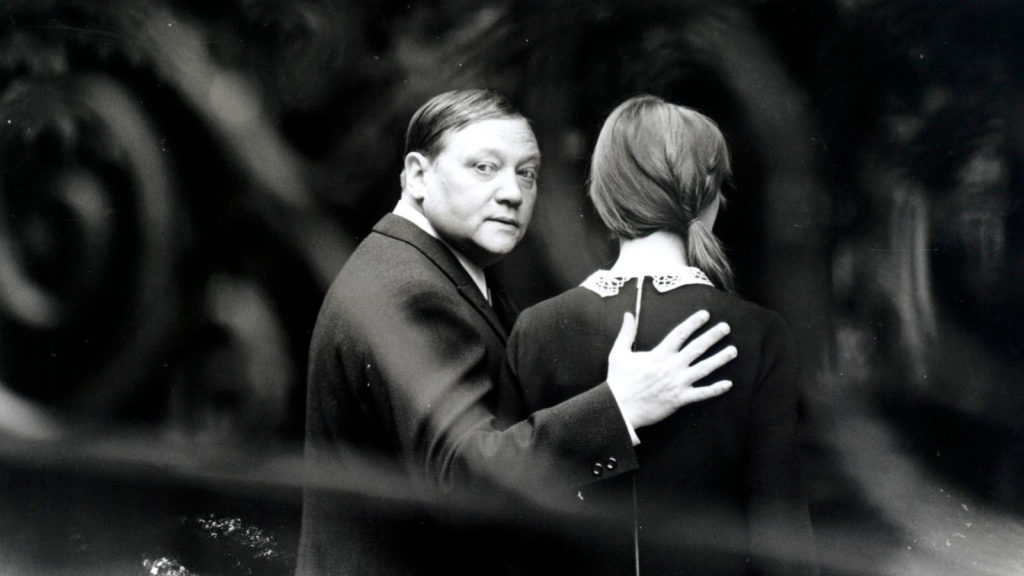
The well-placed shots highlight Hrušínský’s character Karl Kopfrking’s naturally terrorizing gaze that surpasses the known, immortalized iterations of the psychologically impaired by Jack Nicholson in The Shining, Christian Bale in American Psycho, and Anthony Hopkins from the Silence of the Lambs. Hrušínský’s prowess, which breathed life and vivacity to the character, is truly ahead of its time. His character is horrifyingly adept at convincing people of his morbid ideologies. He is the epitome of a vile politician or a pretentious, proud bourgeoisie.
The director furthers our downward odyssey of the cremator’s quirks and impulses in the amusement park. While his family finds amusement rides fascinating, he finds normal recreations tedious. He vilifies these thrills of life with his condemning gazes and deadpan guise. However, what he found enthralling is the claustrophobic chamber of horrors. While these atrocities made from wax are too sickly for most of the spectators, to him they bequeath affinity and alleviation as if for him the world of the dead is just as scenic, or much more vigorous than the effervescent terrain of the living.
His frequent physical contact warrants control rather than comfort, ascertaining his egomaniacal demeanor to control people. While we get angsty by his eerie touches, the people he touches are so swayed by his dynamism that his strokes become caresses of easement and counsel. He also touches the corpses with apparent ease and without the slightest sophistication that these dead bodies are too familiar to him. He establishes and re-establishes his supposed acumen on death by conversing about them and habitually touching them.
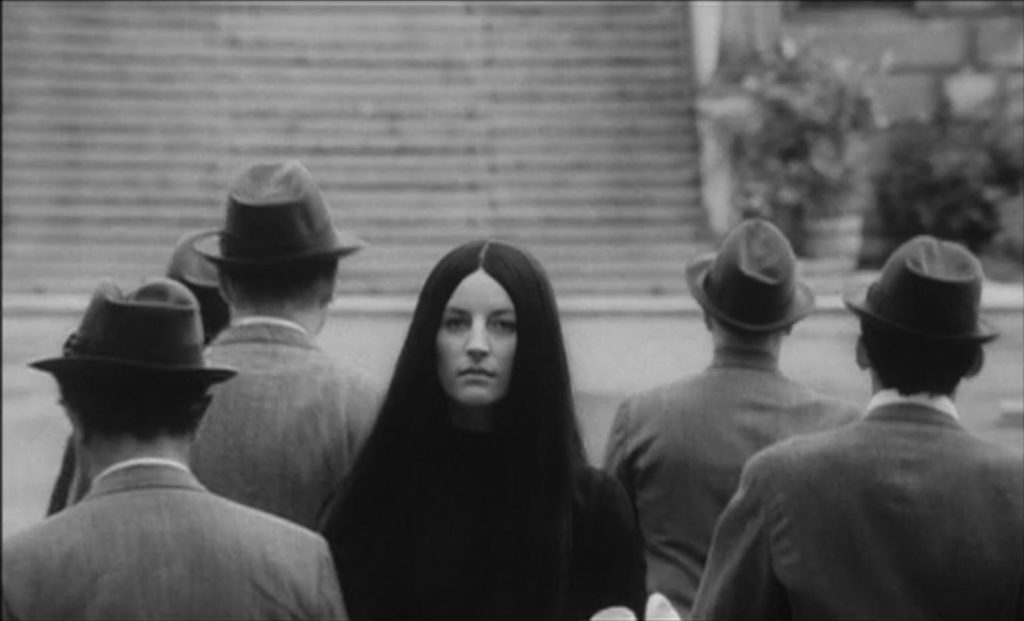
He found his place among the titans when he was encouraged to join the Reich. His vain belief in the transcendental merit of ill-timed death uncannily amounts to the German’s disturbing justification of antisemitism and extermination. The presence of the Germans served as a catalyst to his burgeoning descent to madness. Just as he proclaims liberation is brought by premature death, his murders seem to liberate him from his last piece of sanity.
He is a plethora of hypocrisy. While his self-absorbed and repetitious soliloquies reflect his respected reputation as an existential philosopher, he is barely a vainglorious lunatic, seeking reason for his inhumane delight on the perished. He lionizes women, but he gets easily swayed when Germans lambast women’s mere existence. He esteems a healthy and pure familial love, but he frequently fancies women in brothels and is imbibed by the thought of women. He incessantly declares his intolerance to vices and alcohol, but he is reeking of narcissism and intoxicated by his obsession for power.
The final chase scene is one of the most chilling sequences to ever grace horror cinema. His true nature finally reared its ugly head when his staggering egomania outdoes his “supposed” ultimate duty to liberate his daughter through his murders. He was once a focused and determined mien, but his gluttonous self-love stripped this away from him.
More Film Reviews:
Bodycam (2025) Film Review – You Took Something from Us [Nightmares Film Festival 2025]
Bodycam is a 2025 Canadian found footage horror film written and directed by Brandon Christensen, with additional writing from Ryan Christensen. Brandon is best known as the writer/director behind films…
Senritsu Kaiki File Kowasugi File 01: Operation Capture the Slit-Mouthed Woman (2012) Film Review—A Gem Hidden in Plain Sight
Koji Shiraishi proves his sincerity and devotion to the found footage subgenre in his 2012 low-budget mockumentary Senritsu Kaiki File Kowasugi! File 01 – Operation Capture the Slit-Mouthed Woman. While…
Wrong Turn (2021) Film Review – Hopefully the End of Woke Horror
Woke Horror is just not sustainable… That’s pretty much the takeaway from the Wrong Turn reboot, a reimagining scripted by Halloween 4: The Return of Michael Myers and the writer…
Mors Omnia Solvit Film Review – Yes Today, Satan
Mors Omnia Solvit (aka “Frammenti – I Veneratori di Morte”) is an Italian extreme satanic horror film directed and produced by Congrega Esoterica Padovana. The name is based on a…
Orchestrator of Storms: The Fantastique World of Jean Rollin (2022) Film Review – An Excellent Introduction to the Artistry of an Obscure Filmmaker
Jean Rollin was a French director of fantastique films whose films remained obscure throughout most of his career. Thanks to longtime admirers, his haunting and poetic visions are seducing a…
Frankie, Maniac Woman (2025) Film Review – An Irreverent Punk Scream That Loses Its Voice [Grimmfest 2025]
Premiering at Grimmfest’s annual horror film festival, Frankie, Maniac Woman (2025), directed and co-written by Pierre Tsigaridis, director of Traumatika (2024), arrives with the promise of a searing indictment of…
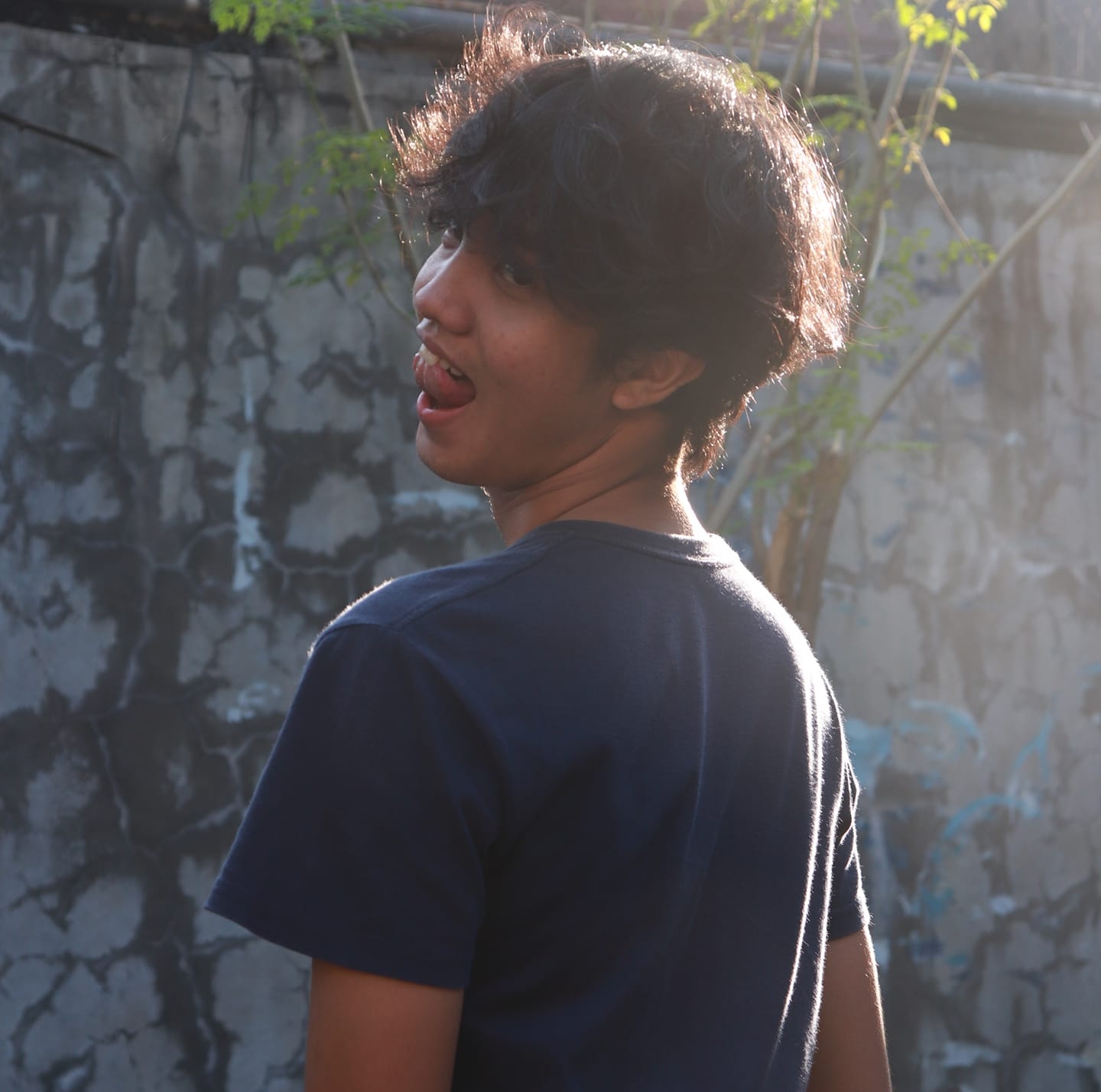
I am a 4th year Journalism student from the Polytechnic University of the Philipines and an aspiring Filmmaker. I fancy found footage, home invasions, and gore films. Randomly unearthing good films is my third favorite thing in life. The second and first are suspending disbelief and dozing off.
![Bodycam (2025) Film Review – You Took Something from Us [Nightmares Film Festival 2025]](https://www.grimoireofhorror.com/wp-content/uploads/2025/10/Untitled-design-9-365x180.jpg)
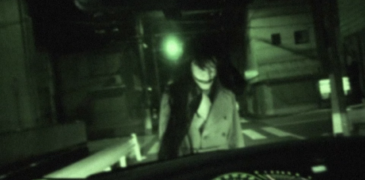


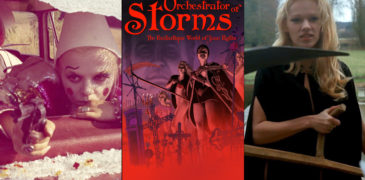
![Frankie, Maniac Woman (2025) Film Review – An Irreverent Punk Scream That Loses Its Voice [Grimmfest 2025]](https://www.grimoireofhorror.com/wp-content/uploads/2025/11/Frankie-Maniac-Woman-2025-cover-365x180.jpg)